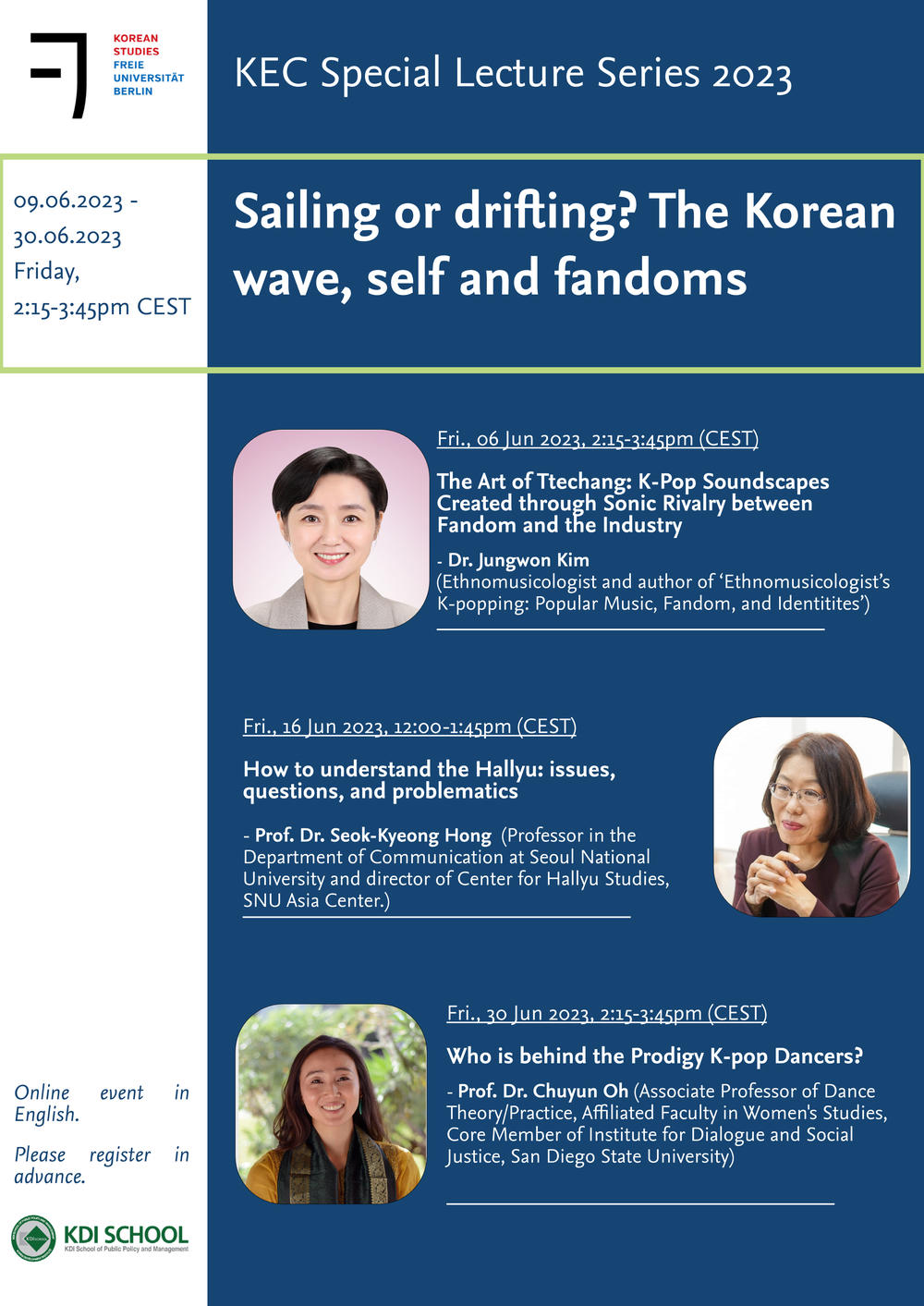KEC Special Lecture Series 2023 - Sailing or drifting. The Korean wave, self and fandoms
The Korean Wave consistently piques the interest of media outlets. Especially in the German context, it is still perceived as a new trend. Sceptic voices remain most visible and question the reasons for its success. The most popular view is the soft-power perspective, painting the Korean cultural industry and its artists as embedded in foreign policy processes. Other views characterise Hallyu as a passing trend, a short-lived anomaly. Lastly, success is sometimes attributed to consumerism, stating that K-pop and other Korean cultural content are designed to appeal to everyone and especially the inexperienced youth. In short, Korean cultural content and its consumers are eyed with both wonder and distrust.
Beyond popular media discourse, academic discussion on how to understand the Korean Wave and its impact on a changing media landscape has emerged. However, until now, the German case was largely sidelined in discussions. Focusing on K-pop, the special lecture series “Sailing or drifting? The Korean Wave, self, and Fandoms” addresses this gap by providing an opportunity to discuss the impact of the Korean Wave on youth. Are individuals simply swept up by the wave or consciously riding it? Moving beyond arguments about the maturity of consumers and/or manipulation by media, the series highlights the artistic dimension of internationally popular Korean music and dances.
Overview
1) 9 June 2023
The Art of Ttechang: K-Pop Soundscapes Created through Sonic Rivalry between Fandom and the Industry
Presenter:
Dr. Jungwon Kim (Ethnomusicologist and author of ‘Ethnomusicologist’s K-popping: Popular Music, Fandom, and Identitites’)
Abstract:
K-pop fans have shaped participatory culture in K-pop as an inclusive cultural phenomenon both within and outside of Korea. However, ignoring fandom and its socio-cultural, socio-political significance, the South Korean government has just taken advantage of K-pop to demonstrate the national soft power dominating the global pop market through Hallyu. Also, non-Korean, especially Western media outlets have disregarded K-pop and the Korean Wave as the subcultural scene forged by young consumers’ dissipation. Relying upon my long-standing autoethnographic research on K-pop fandom, as a K-pop aca-fan, this lecture highlights soundscapes of K-pop, which are constructed through fans’ spontaneous chanting and singing along to live performances, as well as through the K-pop industry’s design of the performances entailing the audience’s voices to create a sonic landscape of the venue. I trace this type of fans’ performing activity, also known as ttechang, to the 1990’s South Korean popular music scene where young audiences were yelling at and singing along with their favorite singers throughout the whole songs at live shows in order to not only express their love for music and musicians but also self-identify as sinsedae, meaning the new generation in Korean, against the old generation. Although the industry has appropriated ttechang to showcase a new package of successfully Koreanized editions of global pop genres through soundscapes characterized by both idol musicians’ spectaculars and fans’ sounds since the late 1990s, that is, the first-generation Korean idol era, audience members, using diverse timbres and tones of their voices in the performance of ttechang, have not only cultivated both their listenership and musicianship but also extended the range of musical sounds in the definition of K-pop. In particular, the global fans’ chanting and singing along to K-pop songs in Korean all over the world indicates how K-pop can be redefined through diversity and inclusion across cultural (linguistic, ethnic, and racial) differences regardless of disputes between Korean/non-Korean media and academia about authenticity and artistry around K-pop. The lecture then sheds light on how K-pop fandom, actively participating in ttechang during live shows, has contributed to the development of K-pop soundscapes while conforming or challenging to commercial and industrial schemes which have exploited the audience.
2) 16 June 2023
How to understand the Hallyu : issues, questions, and problematics
Presenter:
Prof. Dr. Seok-Kyeong Hong (Professor in the Department of Communication at Seoul National University and director of Center for Hallyu Studies, SNU Asia Center)
Abstract:
As a global phenomenon outside of East Asia, the Korean Wave is a thoroughly grassroots phenomenon. Institutional mediators did not bring Korean cultural products to their home countries and introduce them to the world, but rather the global audience spontaneously subtitled and mediated by taste communities in the global digital cultural environment created by the Internet. Unlike Japanese manga and anime, the Korean Wave offers a more inclusive discourse in terms of race and gender because it has a human face and embodies new relationships that Western popular culture does not. The hybrid nature of Korean popular culture also gives the Korean creative industries the freedom to actively and inclusively embrace and express different cultural trends from around the world. Therefore, the attitude of foreign media and scholars that there is a hidden recipe for the success of Korean popular culture, or understanding it as a soft power theory of the government, is problematic. This lecture is an explanation and challenge to these questions.
3) 30 June 2023
Who is behind the Prodigy K-pop Dancers?
Presenter:
(Associate) Prof. Dr. Chuyun Oh (Associate Professor of Dance Theory/Practice, Affiliated Faculty in Women's Studies, Core Member of Institute for Dialogue and Social Justice, San Diego State University)
Abstract:
Who is behind the prodigy K-pop dancers and teen K-pop influencers? Globally talented young trainees come to South Korea and become professional artists even before getting accepted to K-pop agencies. Based on her #1 Amazon New Release bestseller K-pop Dance (Routledge, 2022), Dr. Chuyun Oh, the pioneer of K-pop dance studies, shares her insight on conservatory performing arts education in South Korea and how young prodigy children claims their voice and agency on social media in accordance and against with competitive neoliberal capitalism and training system.
Moderator: Gwendolyn Domning
Time & Venue:
Monday, June 9th 2022 - June 30th 2023
2:15 - 3:45 PM (CEST)
Webex (online)
Weitere Informationen
Gwendolyn Domning (g.domning@fu-berlin.de)

